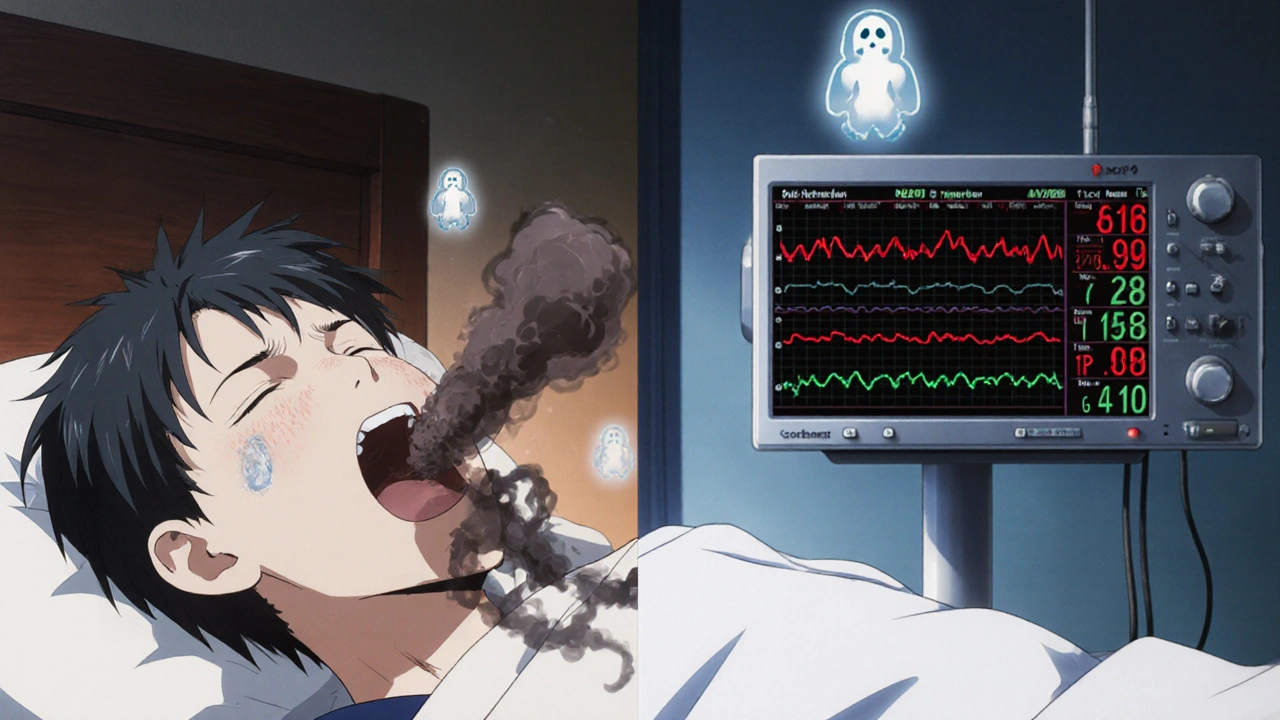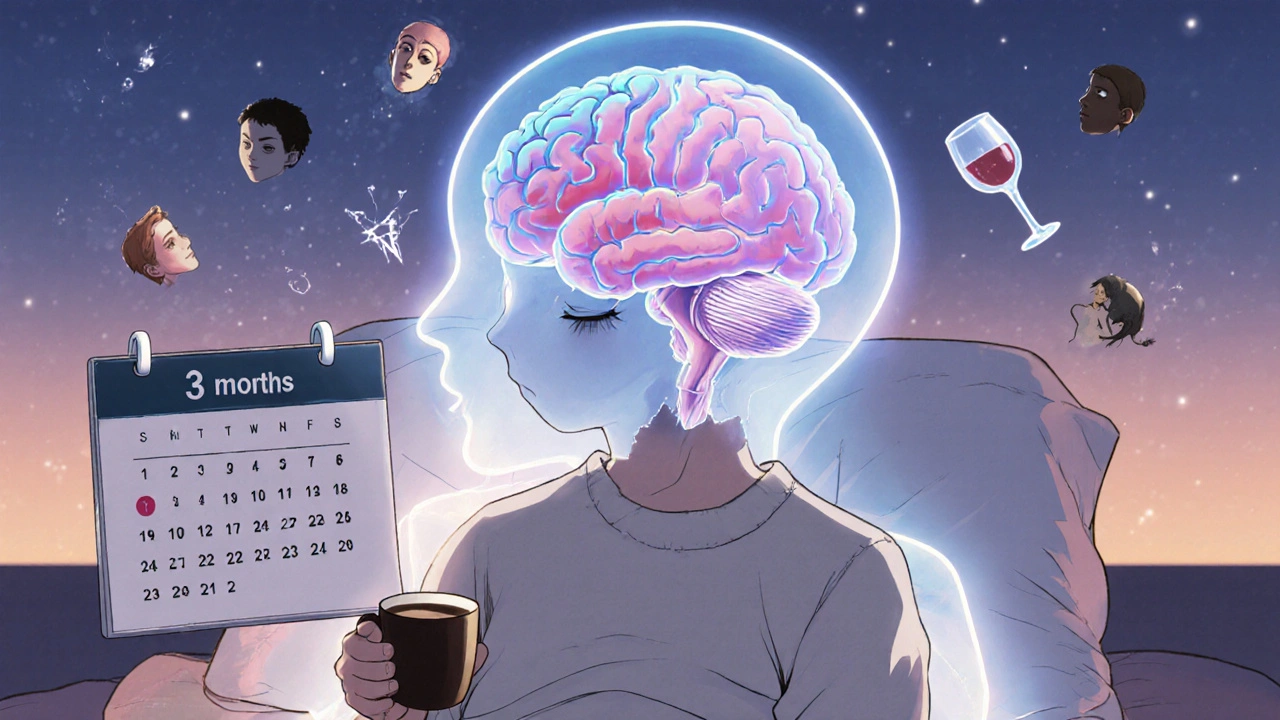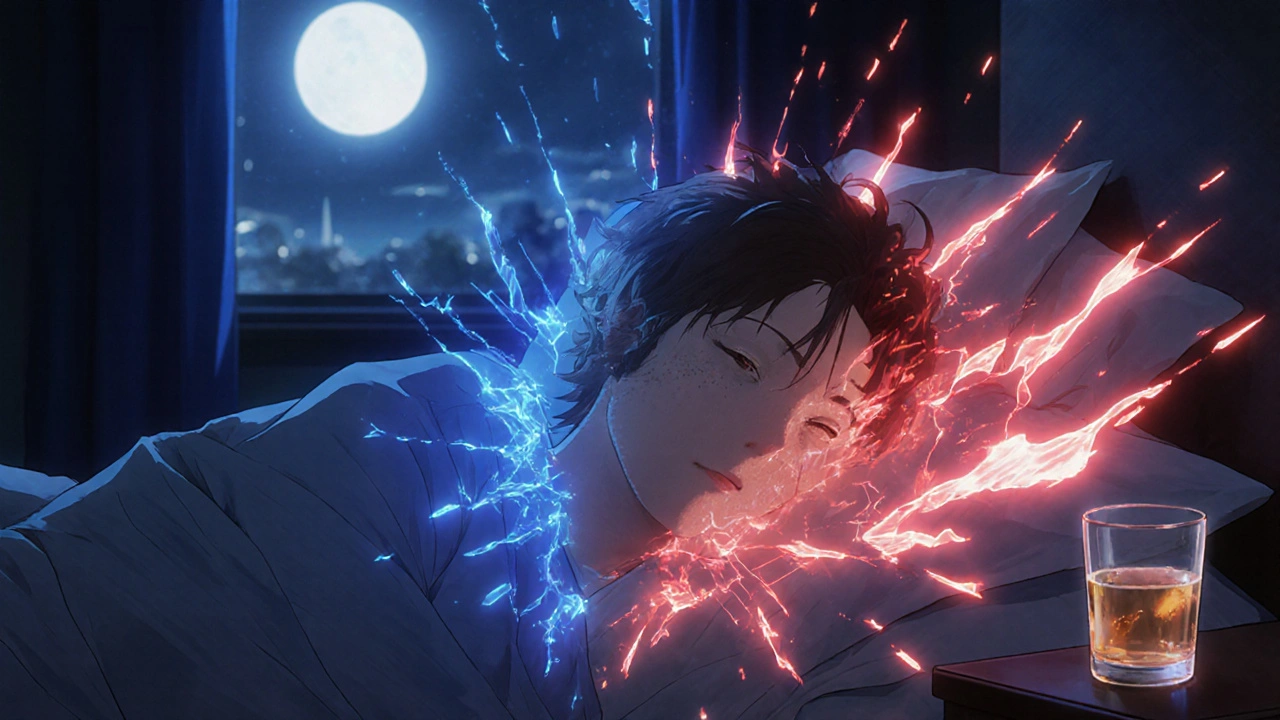Many people believe having a drink before bed helps them sleep better. It’s a common habit - a glass of wine to unwind, a beer to calm the mind. But what actually happens to your body when alcohol meets your sleep cycle? The truth is, alcohol doesn’t improve sleep. It fragments it, worsens sleep apnea, and leaves you feeling off the next day - even if you think you slept fine.
How Alcohol Tricks Your Brain Into Falling Asleep
Alcohol acts as a depressant. At first, it slows down your nervous system, making you feel drowsy. This is why people feel like they fall asleep faster after drinking. But that initial sleepiness is misleading. Alcohol doesn’t help you sleep - it forces your brain into sleep prematurely, like hitting the pause button on your natural rhythm.Studies show that a single drink (about 0.5 ounces of pure alcohol) can reduce the time it takes to fall asleep by 10 to 15 minutes. But here’s the catch: this only happens in the first half of the night. As your body breaks down the alcohol - roughly one drink per hour - your brain starts to rebound. By 2 to 4 a.m., alcohol levels drop, and your nervous system goes into overdrive. That’s when the real sleep problems begin.
The Two-Phase Sleep Disruption
Your sleep isn’t one steady state. It cycles through stages: light sleep, deep sleep, and REM sleep. Alcohol throws this cycle completely out of balance.In the first few hours, alcohol boosts deep sleep (Stage N3). That’s the restorative phase where your body repairs tissues and strengthens the immune system. Sounds good, right? But here’s what you don’t see: while deep sleep increases early on, REM sleep - the stage linked to memory, emotion, and creativity - gets suppressed by up to 50%.
Then, as alcohol leaves your system, your brain tries to make up for lost REM. You get a surge of it in the second half of the night. This causes vivid dreams, nightmares, and sudden awakenings. The result? You wake up multiple times without realizing why. Your sleep feels broken, even if you slept for eight hours.
A 2023 study with 31 participants found that drinking alcohol before bed reduced total sleep time by nearly 20 minutes and cut sleep efficiency (the percentage of time spent actually sleeping while in bed) by 4.3%. Even worse, heart rate spiked by 6.7 beats per minute overnight - your body was working harder just to keep you alive while you slept.
Alcohol and Sleep Apnea: A Dangerous Combo
If you snore or have sleep apnea, alcohol makes it much worse. Sleep apnea happens when your throat muscles relax too much during sleep, blocking your airway. Alcohol relaxes those muscles even further.Research from the American Academy of Sleep Medicine shows that each standard drink you have before bed increases your apnea-hypopnea index (AHI) by 20%. That means more breathing pauses, lower oxygen levels, and more stress on your heart. A 2022 meta-analysis found that drinking 2 to 4 drinks daily raises your risk of moderate-to-severe sleep apnea by 25%. With five or more drinks, the risk jumps to 51%.
The American Thoracic Society warns that people with sleep apnea should avoid alcohol entirely within three hours of bedtime. Even one drink can drop your blood oxygen levels by 3 to 5 percentage points during sleep events. That’s not just uncomfortable - it’s dangerous for your heart and brain.

Next-Day Effects: You’re Not Just Tired, You’re Impaired
Most people think if they slept “long enough,” they’re fine the next day. But sleep quality matters more than quantity.After drinking, you lose up to 15.3% of your slow-wave sleep - the deepest, most restorative stage. This doesn’t just make you groggy. It directly impacts your brain’s ability to think clearly. One study found that cognitive processing speed dropped by 12.7% and working memory dropped by 9.4% the next morning - even when total sleep time was nearly the same as a sober night.
Emotional control takes a hit, too. People who drank before bed showed 31.2% more emotional reactivity to negative stimuli the next day. That means you’re more likely to snap at coworkers, feel overwhelmed by small stressors, or cry over things that wouldn’t normally bother you.
And here’s the scary part: most people don’t notice. The same 2023 study found that participants didn’t feel significantly worse emotionally or mentally - even though their performance on cognitive tests had dropped. You think you’re okay. But your brain isn’t.
Chronic Use Leads to Lasting Damage
One night of drinking? Bad enough. But regular use? That’s a slow-motion disaster.A 36-year longitudinal twin study showed that heavy drinkers were over three times more likely to report poor sleep quality than non-drinkers. And the link only got stronger with age. A 2023 review in Sleep Medicine Reviews found that people who regularly drink before bed are 38% more likely to develop chronic insomnia.
For older adults, the damage is even more serious. Research from the University of Pittsburgh Medical Center found that regular pre-sleep alcohol use accelerates cognitive decline by 23% over five years. Your brain loses its ability to form new memories, process information, and stay sharp - faster than in people who avoid alcohol at night.
And if you’re trying to quit drinking? Sleep problems often stick around. The National Institute on Alcohol Abuse and Alcoholism reports that 50 to 70% of people in early recovery struggle with severe insomnia. It can take 3 to 6 months for sleep architecture to return to normal after stopping alcohol - longer than most people expect.

The Myth of the Nightcap
The idea that a nightcap helps you sleep is a myth built on feeling, not fact. Every objective study - using brain scans, heart monitors, and sleep trackers - shows the same thing: alcohol harms sleep quality at every dose.A 2023 meta-analysis in Addiction Biology reviewed over 100 studies and found no evidence that alcohol improves sleep. Not even one drink. It reduces REM sleep by 9.3%, increases fragmentation by 11.7%, and disrupts your natural sleep rhythm every single time.
And here’s the cycle no one talks about: when you wake up tired after drinking, you think, “I need another drink to sleep better tomorrow.” That’s how dependence starts. The University of Missouri found that sleep deprivation after binge drinking increases the urge to drink more - creating a loop that can lead to alcohol use disorder.
What Should You Do Instead?
If you want better sleep, ditch the alcohol at night. Here’s what actually works:- Stop drinking at least 3 hours before bed - give your body time to process it.
- Swap alcohol for herbal tea, warm water with lemon, or sparkling water with mint.
- Keep your bedroom cool, dark, and quiet. Your body needs a calm environment to sleep well.
- Try a 10-minute breathing exercise before bed. Inhale for 4 seconds, hold for 4, exhale for 6. Repeat 5 times.
- If you struggle with sleep, talk to a doctor. Sleep issues aren’t normal - and they’re treatable.
Alcohol might feel like a quick fix. But it’s a thief. It steals your deep sleep, worsens breathing problems, and leaves your brain sluggish the next day. You don’t need to quit drinking entirely - but if you care about how you feel in the morning, stop using alcohol as a sleep aid.
Does alcohol help you sleep better?
No. While alcohol may help you fall asleep faster, it disrupts sleep quality by reducing REM sleep, increasing nighttime awakenings, and worsening sleep apnea. Objective sleep studies show all levels of alcohol consumption before bed harm sleep architecture.
How does alcohol cause sleep fragmentation?
Alcohol increases deep sleep early in the night, then triggers a rebound effect as it metabolizes. This causes REM sleep to surge later, leading to vivid dreams, nightmares, and frequent awakenings. Your brain struggles to maintain stable sleep cycles, resulting in fragmented, non-restorative sleep.
Can alcohol make sleep apnea worse?
Yes. Alcohol relaxes the muscles in your throat, increasing airway collapse during sleep. Each standard drink raises your apnea-hypopnea index (AHI) by 20%. People with sleep apnea are advised to avoid alcohol within 3 hours of bedtime to prevent dangerous drops in oxygen levels.
Why do I feel tired even after sleeping 8 hours after drinking?
Because alcohol reduces slow-wave sleep - the most restorative stage - by up to 15.3%. Even if you slept long enough, your body didn’t get the deep recovery it needs. This leads to next-day brain fog, slower thinking, and reduced memory recall.
How long does it take for sleep to return to normal after quitting alcohol?
For most people, sleep architecture begins improving within days, but full recovery can take 3 to 6 months. During early abstinence, insomnia and vivid dreams are common. This is normal and not a sign of failure - it’s your brain readjusting to natural sleep rhythms.
Is there a safe amount of alcohol to drink before bed?
No. Even one standard drink reduces REM sleep by 9.3% and increases sleep fragmentation by 11.7%. There is no threshold where alcohol improves sleep. The safest choice for sleep quality is to avoid alcohol entirely in the hours before bed.


Comments
robert cardy solano
Been trying to quit night drinks for a month now. Sleep’s been a mess but at least I’m not waking up gasping anymore. My wife says I stopped snoring like a chainsaw. Worth it.
Nick Naylor
Alcohol is a national security threat. Every time someone chugs a beer before bed, they’re sabotaging their REM cycles, lowering their oxygen saturation, and weakening their cognitive resilience. This isn’t a lifestyle choice-it’s a public health crisis disguised as relaxation. The data doesn’t lie. We’re collectively sleep-deprived because we refuse to accept that chemical crutches don’t fix broken biology.
Pawan Jamwal
Bro in India we’ve been doing this for centuries-warm milk with turmeric, not whiskey. Alcohol is a Western crutch. Your brain doesn’t need to be drugged to sleep. Try yoga nidra. Or better yet-stop lying to yourself. You’re not ‘unwinding,’ you’re self-sabotaging.
And yes I’ve got 3 patents in sleep tech. I know.
Bill Camp
Let me be clear: if you’re drinking before bed, you’re not sleeping-you’re surviving a chemical hostage situation. Your brain is screaming for balance while your liver tries to clean up your mess. And then you wake up and wonder why you feel like a zombie who lost a fight with a truck. This isn’t myth. This is forensic science.
Lemmy Coco
i was gonna say somethign bout how i thought i slept good after a glass of wine but then i got a sleep tracker and holy crap my rem was like 5%… i’ve been switching to chamomile and honestly it’s way better. i dont feel like i got hit by a bus in the morning. sorry for the typos, typing on phone
rob lafata
You think you’re just having a nightcap? Nah. You’re a walking apnea incubator with a side of cognitive decay. That ‘relaxing’ glass? It’s a velvet hammer to your prefrontal cortex. You’re not sleeping-you’re performing a slow-motion suicide by sedation. And don’t even get me started on how you’ll snap at your kid over spilled cereal because your amygdala’s been on a drunken bender all night. Wake the hell up.
Matthew McCraney
They don’t want you to know this but Big Pharma and Big Alcohol are in bed together-literally. They profit off your broken sleep. The FDA knows alcohol worsens apnea. They just don’t care. They’re selling you Ambien and wine like it’s a package deal. Look at the ads. They never show the 3 a.m. panic attack after the alcohol wears off. That’s the real product.
serge jane
There’s something deeply human about seeking comfort in rituals. The nightcap isn’t about sleep-it’s about control. We live in a world that never stops demanding, so we grab the nearest tool to shut it down. Alcohol is just the easiest lever. But what if the real solution isn’t removing the drink, but learning to sit with the silence? To let your nervous system rest without chemical crutches? That’s the harder path. But it’s the only one that leads to true restoration.
Brianna Groleau
I used to drink every night to fall asleep after working double shifts as a nurse. Then one night I woke up drenched in sweat, heart pounding, convinced I was having a heart attack. Turned out it was just my body screaming from alcohol withdrawal. I switched to lavender tea and a 5-minute gratitude journal. Now I sleep like a baby. Not because I’m perfect-but because I finally stopped lying to myself about what ‘relaxing’ really means.
And honestly? I miss the wine. But I don’t miss waking up feeling like my brain was used as a punching bag.
Rusty Thomas
OMG I JUST REALIZED I’VE BEEN DOING THIS FOR 12 YEARS. I THOUGHT I WAS JUST A ‘LIGHT DRINKER’ BUT MY WIFE SAYS I SCREAM IN MY SLEEP AND KICK THE DOG. I JUST WATCHED A VIDEO OF MYSELF AND I LOOK LIKE A ZOMBIE TRYING TO SWIM. I’M QUITTING. TOMORROW. I’M TELLING MY BOSS I NEED A ‘SLEEP RESET.’
Sarah Swiatek
Let’s be real-the real tragedy isn’t the fragmented sleep or the apnea spikes. It’s the quiet erosion of your emotional bandwidth. You think you’re fine because you didn’t cry. But you snapped at your partner over the dishes. You ignored your kid’s drawing because you were ‘too tired.’ You called in sick because ‘you just couldn’t focus.’ And you blamed the job, the stress, the kids. But it’s the alcohol. It’s always the alcohol. You’re not lazy-you’re neurologically compromised. And you deserve better than that.
Dave Wooldridge
Did you know the military banned alcohol before duty for a reason? They know sleep fragmentation kills performance. And now you’re doing it to yourself every night? You think you’re in control? You’re just a lab rat in a glass of Pinot. They’ve studied this since the 1970s. You’re not special. You’re not ‘just one drink.’ You’re part of the data set. The one that ends in dementia.
Rebecca Cosenza
One drink. Just one. That’s all I had. And I still woke up at 3 a.m. gasping. Not worth it.
swatantra kumar
Bro I tried this in Delhi last year. No alcohol for 30 days. First week? Nightmares. Second week? Woke up feeling like a human. Third week? I started reading again. Fourth week? My wife said I smiled more. Now I drink sparkling water with lime and call it ‘adult lemonade.’ Life’s better without the chemical crutch. 🍋
Cinkoon Marketing
Interesting. But have you considered that maybe people just like the taste? Or the ritual? Maybe sleep isn’t the only thing that matters. I mean, I’ve had some of my best conversations after a glass of wine. Maybe we’re over-medicalizing a simple pleasure?